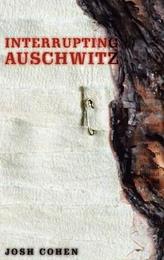
|
Interrupting Auschwitz: Art, Religion, Philosophy
Hardback
Main Details
| Title |
Interrupting Auschwitz: Art, Religion, Philosophy
|
| Authors and Contributors |
By (author) Josh Cohen
|
| Physical Properties |
| Format:Hardback | | Pages:186 | | Dimensions(mm): Height 234,Width 156 |
|
| Category/Genre | Philosophy |
|---|
| ISBN/Barcode |
9780826455512
|
| Classifications | Dewey:190 |
|---|
| Audience | |
|---|
|
Publishing Details |
| Publisher |
Bloomsbury Publishing PLC
|
| Imprint |
Continuum International Publishing Group Ltd.
|
| Publication Date |
1 January 2003 |
| Publication Country |
United Kingdom
|
Description
Hitler, wrote Theodor Adorno, imposed "a new categorical imperative on humankind...to arrange thoughts and actions so that Auschwitz will not repeat itself." Interrupting Auschwitz argues that what gives this imperative its philosophical force and ethical urgency is the very impossibility of fulfilling it. But rather than being cause for despair, this failure offers a renewed conception of the tasks of thought and action. Precisely because the imperative cannot be fulfilled, it places thought in a state of perpetual incompletion, whereby our responsibility is never at an end and redemption is always interrupted.Josh Cohen argues that both Adorno's own writings on art after Auschwitz and Emmanuel Levinas' interpretations of Judaism reveal both thinkers as impelled by this logic of interruption, by a passionate refusal to bring thought to a point of completion. The analysis of their motifs of art and religion are brought together in a final chapter on the poet-philosopher Edmond JabFs.PHILOSOPHY
Author Biography
Josh Cohen is Lecturer in English at Goldsmiths College, University of London. He is the author of Spectacular Allegories: Postmodern American Writing and the Politics of Seeing.
Reviews"This is a singular book of enormous importance. Interrupting Auschwitz forges another way of thinking that is neither simple invention nor mere speculation. While there are many books that take the theme of Auschwitz, Cohen's work transcends any easy identification with holocaust studies. He knows the difficulties and therefore follows exacting and complex thought with great rigour, insisting that Auschwitz is a key problem for how we think."--Andrew Benjamin, Monash University "Cohen underscores the necessity to remember history and write literature, or make art that can face-up to the terrible past and provide moral principles that could assure that Auschwitz will never happen again. Simultaneously the author is acutely aware of the impossibility of doing so. Rather than adopting Adorno's pessimism, Cohen reasons that the impossibility of this assurance places ethical thought in a state of continuous, endless incompleteness. Thus, closure is impossible, redemption is unattainable and our responsibility never ends. ... Rather than being understood in terms of a will to finality, the redemption is interpreted as an 'interruptive' thought, a refusal to bring thought to any point of completion. Very creatively, Cohen calls this ethical task 'interrupting' which signifies two distinct meanings, but both essential to our present-day thinking." -C. Oscar Jacob, Janus Head, 7.1, 2004 "Cohen underscores the necessity to remember history and write literature, or make art that can face-up to the terrible past and provide moral principles that could assure that Auschwitz will never happen again. Simultaneously the author is acutely aware of the impossibility of doing so. Rather than adopting Adorno's pessimism, Cohen reasons that the impossibility of this assurance places ethical thought in a state of continuous, endless incompleteness. Thus, closure is impossible, redemption is unattainable and our responsibility never ends. ... Rather than being understood in terms of a will to finality, the redemption is interpreted as an 'interruptive' thought, a refusal to bring thought to any point of completion. Very creatively, Cohen calls this ethical task 'interrupting' which signifies two distinct meanings, but both essential to our present-day thinking." -C. Oscar Jacob, Janus Head, 7.1, 2004
|